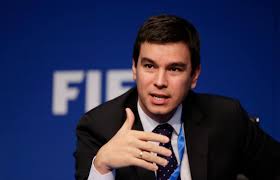By Andrew Warshaw
November 19 – In a ground-breaking initiative that will be widely welcomed throughout the game, FIFA is to introduce radical new regulations covering maternity leave for female players – and could impose fines and transfer bans on clubs not meeting the new standards.
The proposals will ensure women players are ensured maternity leave of no fewer than 14 weeks – at least eight weeks after childbirth – and be paid a minimum of two thirds of their contracted salary.
Under the proposals, clubs will be “under an obligation to reintegrate” players to the club and provide “adequate ongoing medical support”.
While many players in Europe are already protected by employment law, FIFA says its aim is to create “new global minimum standards” for female players across the world.
“The idea is to protect female players before, during and after childbirth,” said FIFA’s chief legal and compliance officer Emilio Garcia Silvero (pictured). “We think these rules are part of common sense”
The rules are expected to be approved by the FIFA Council next month and would take effect on January 1.
“The clubs will not be allowed to terminate the contract of a player on the grounds of a player becoming pregnant,” Silvero was quoted as saying during a conference call. “If this is the case, we are going to impose not only a fine, and compensation to the player, but also a sporting sanction.
“We are going to impose a transfer ban on the club. From now on, female players will be better protected.”
England international Jodie Taylor, a member of the global player council of world players’ union FIFPro, welcomed the move as “such an impactful and meaningful addition to our sport.”
“Women’s footballers need these types of regulations to ensure that we can continue our careers confident that adequate provisions are in place should we decide to have children, which is both reassuring for us as players and reflective of what the professional game needs to keep growing.
“Hopefully this is the beginning of even more progressive and inclusive policies for female players,” she said.
FIFPro’s general secretary Jonas Baer-Hoffmann was less effusive and more cautious as he also gave the initiative the thumbs-up.
“This is only a first step, because these regulations represent a minimum set of protections,” Jonas Baer-Hoffmann said.
“We will continue to push – internationally and domestically – for more holistic parental policies and even more favourable conditions, such as longer maternity periods and considerations for parents in general.”
“No player should face discrimination, and certainly not as a result of pregnancy or for tending to the basic human needs of a mother and her child after giving birth.”
Contact the writer of this story at moc.l1745210301labto1745210301ofdlr1745210301owedi1745210301sni@w1745210301ahsra1745210301w.wer1745210301dna1745210301

